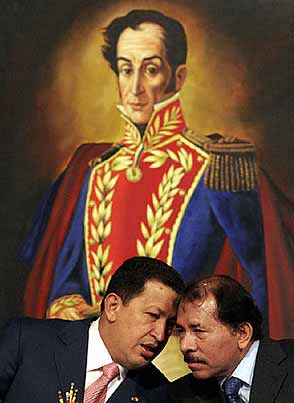13.09.2008
September 08, 2008 (the date of publication in Russian)
Alexander Rublev
SOUTH AMERICA HELPS SOUTH OSSETIA
Russia should not undervalue the support from Latin American nations in the Caucasus conflict
 Today, we witness a curious symmetry in international, political, and military technological connections. While the United States is trying to create an anti-Russian alliance from former Soviet republics in Europe, another alliance of states, pursuing independence from Washington and friendly towards Moscow, is emerging in Latin America.
Today, we witness a curious symmetry in international, political, and military technological connections. While the United States is trying to create an anti-Russian alliance from former Soviet republics in Europe, another alliance of states, pursuing independence from Washington and friendly towards Moscow, is emerging in Latin America.
The difference between GUAM (Georgia-Ukraine-Azerbaijan-Moldova) and the Venezuela-led ABLA is essential: while the former is a US project built for US money in the US interests, the current leaders of ABLA, as well as several of its allies from the Caribbean, have come to power without any support from outside. They don't have any binding political obligations before other states, and their power is based on broad popular support, not on US dollar injections.
GUAM, originally founded for the purpose of establishing the long-debated alternative (to Russia) energy supply for Europe, in fact capitalizes today from arms trade, as it was proven shortly after Georgia's assault on South Ossetia. Meanwhile, ABLA is a functioning economic project, involving cooperation of South American nations in energy, agroindustry, as well as in education and health care.
In the conflict over South Ossetia and Abkhazia, the two former autonomies of Georgia, in fact existing independently since 1992 and officially recognized by Russia only after the brutal crackdown of US-trained Georgian troops upon one of them, Venezuela and Nicaragua firmly supported the decision of Russia. On September 5, Nicaragua became the first country after Russia to recognize independence of South Ossetia and Abkhazia. Hugo Chavez, in his turn, not only encouraged Russia's military operation against the Georgian butchers but also proposed to organize joint Russian-Venezuelan naval maneuvers in the Caribbean in December.
Responding to accusations of a "deal with Russian imperialism", Chavez indicated that the proposed maneuvers are nothing different from the South Cross exercises involving France, the Netherlands, and Brazil.
Is the political choice of Caracas and Managua important for Moscow? Foreign agencies of influence are trying to convince us that this political achievement of Russia is just a diplomatic oddity, and that Russia should even be ashamed for having such partners.
This viewpoint is shared even by some state-owned media. One of the largest state-run websites followed the report about the proposed maneuvers, with a headline "Why Does Russia Team Up with Rogue States"?
This biased view of Venezuela and Nicaragua suggests that we are being imposed an essentially inadequate vision of global reality, in which a rogue state is anybody on whom the State Dept's finger would point.
In case we make an objective judgment, based on international law, we'll have to admit that the list of rogue states should rather include the regimes of Ukraine and Georgia than the governments of Venezuela and Nicaragua.
Unlike Ukraine's President Yushchenko, Hugo Chavez and Daniel Ortega came to power through legitimate elections and not through a coup d'etat dubbed "orange revolution". Unlike Saakashvili, they did not commit military crimes, exterminating living quarters with churches, hospitals, and schools and victimizing thousands of civilians. Unlike US-friendly oil monarchies, they have never financed terrorist groups, operating across the globe, including Afghanistan and North Caucasus.
Claims that the ABLA countries are in international isolation are a propagandist theory, having not much in common with reality. Chavez's government expands cooperation with a number of countries of Western Europe, as well as Asia, and achieves spectacular success.
Recently, a well-known European politician, former London Mayor (2000-2008) Ken Livingstone agreed to become an official advisor of Hugo Chavez. He promised to help the Venezuelan leader to make Caracas one of the most beautiful and comfortable cities of the world.
Observers already drive parallels between Livingstone and Gerhard Schroeder, the former general Chancellor of Germany who agreed to take the position of chairman in the Russian-German gas pipeline project, NEGP. However, a politician of Livingstone's scale would not choose an insignificant country to cooperate with, while the comparison with Germany is quite gratifying for Venezuela.
Thus, Russia should assess the support, received from the two Latin American countries, with due significance and gratitude. These two countries, in their strife for independent policies, have encountered the same international pressure as that now experienced by Russia.
Number of shows: 1244
 ENG
ENG 

 ENG
ENG 
